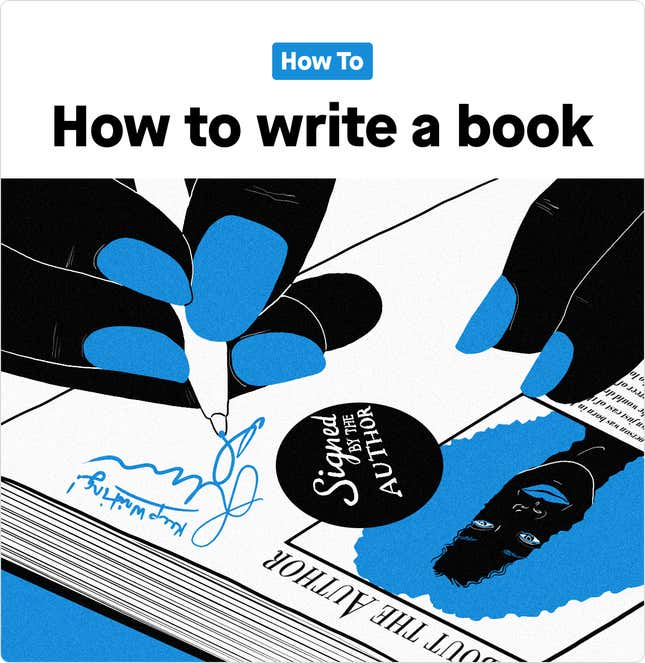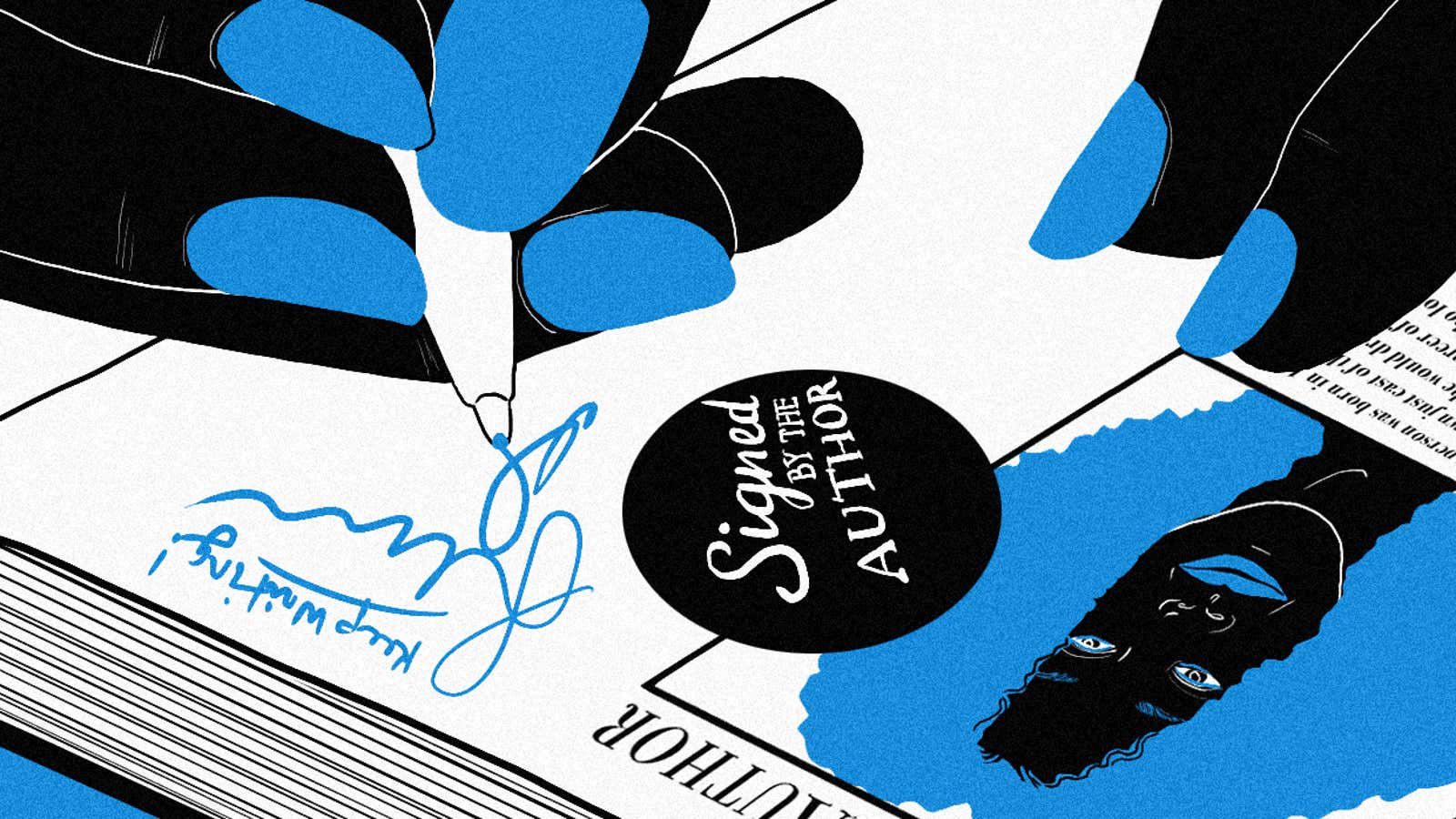
Hi Quartz members,
I’ve always loved gritty-yet-quippy stories about teen girls facing down darkness, from Buffy the Vampire Slayer to Pretty Little Liars and Veronica Mars. So in the summer of 2016, I sat down to take a stab at a tale of my own—a feminist young adult zombie novel.
Five years later, I’m only one-fifth of the way into my intended book. I want to make more progress—but how do people manage to complete the tome of their dreams while balancing work, family, social life, and everything else?
A lot of the advice from authors on this matter boils down to “just sit down and start typing”—which, fair enough, John Cheever or whoever you are. But the problem for a lot of people isn’t figuring out how to begin writing a book, which is where the sit-and-type advice has the biggest payoff. It’s how to persist through all the self-doubt and confusion and wrong turns and actually finish the damn thing.
In that spirit, here’s some of the best practical advice I could find on how to see your book through, whether you’re working on a memoir, a thriller, or a management book. This isn’t about getting published, which is an entirely different matter. Nor is it about finding your voice or writing realistic dialogue. These are tips aimed at helping you get organized, stay on top of the project, and push through.
Step 1: Remember, this is supposed to be fun
A strange quirk of the writing profession is that writers love to groan about how hard writing is. Still, it does seem that the place where a lot of book-writing goes awry is when it stops being fun or interesting and starts to become a slog. Of course you’re not going to throw yourself into a book that feels like a drag when you could be watching Great British Bake Off!
That’s why a lot of authors emphasize the importance of enjoying yourself. At a book talk back in 2019, Trick Mirror author Jia Tolentino offered this piece of advice to emerging writers:
You can’t control anything about this industry. Whether you’ll get paid well, whether you’ll get paid, whether people will read you, what they’ll think when they do.
But you can control the amount of pleasure you can generate for yourself in your work … You can make writing fun and hard for yourself so that even if nothing comes of it, it will be worthwhile to have done it. It has to be an end in itself.
Quartz senior reporter Samanth Subramanian, author of three books including A Dominant Character, adds that it’s important to keep your ability to have fun top of mind when you’re first embarking on the endeavor. “Only write a book whose subject you’re absolutely in love with,” he advises. “You have to spend three to four years with it. If you embark on something you’re only mildly enthusiastic about, you’ll get bored and then the book will feel like a chore and read badly.”
Step 2: Set a writing goal
Horror titan Stephen King has written dozens of books, including the classic memoir-cum-master class On Writing. In the book, published in 2000, King advises would-be authors to set daily writing goals to keep themselves on task:
I suggest a thousand words a day, and because I’m feeling magnanimous, I’ll also suggest that you can take one day a week off, at least to begin with. No more; you’ll lose the urgency and immediacy of your story if you do. With that goal set, resolve to yourself that the door stays closed until that goal is met.
King himself aims for more like 2,000 words a day, or about 10 pages. “I believe the first draft of a book—even a long one—should take no more than three months, the length of a season,” he reflects.
Step 3: Don’t get stuck
Inevitably, authors find themselves churning out pages and pages of work that is boring or saccharine or nonsensical. That’s normal and fine! The key is to acknowledge that’s part of the process, rather than letting frustrations swell into a case of writer’s block.
Brit Bennett, author of the acclaimed novels The Mothers and The Vanishing Half, tells Fiction Writers Review:
I had plenty of those frustrating days where you write all morning just to realize it wasn’t working and I needed to delete everything. At first, those felt like wasted days, but I had to learn to realize that invisible work is real work. Learning what story you don’t want to tell is as important as learning which one you want to tell.
Writing about research into creative blockages in the New Yorker, Maria Konnikova (herself the author of books including The Biggest Bluff and The Confidence Game) finds that low-stakes writing also helps people out of ruts.
“It’s useful to escape from external and internal judgment—by writing, for instance, in a dream diary, which you know will never be read—even if it’s only for a brief period,” she writes. “Such escapes allow writers to find comfort in the face of uncertainty; they give writers’ minds the freedom to imagine, even if the things they imagine seem ludicrous, unimportant, and unrelated to any writing project.” Graham Greene, it turns out, credited keeping a dream journal with helping him to find his way out of literary paralysis.
Step 4: Don’t go it alone
Another point emphasized by many writers is the importance of accountability. Quartz Africa editor Ciku Kimeria, whose novel Dance of the Monkeys came out last year, joined an author support group during the pandemic in which writers checked in with one another on progress once a week. “I’m totally okay with disappointing myself, but as a life-long people pleaser, I really don’t like disappointing other people,” she says.
Dave Eggers, author of books including The Every and The Circle, tells Quartz that seeking feedback during the writing process can help keep insecurities at bay. With his first book, A Heartbreaking Work of Staggering Genius, he gave his editor the book in pieces. “I’d say, ’Tell me if I’m still on track,’ and he would say, ‘Yup, keep going.’ He didn’t want to slow momentum. Without his very congenial, hands-off approach, I would never have done it.”
Sharing pieces of your work with readers you trust can also help you course-correct if needed. “If it’s your first book, don’t think that you have to be writing a book,” Eggers advises. “Think about writing a chapter. Show it to 10 readers you trust and say, ‘Am I onto something?’ Do your revisions based on their comments. If you get that one chapter right and everyone’s like, ‘Oh, I can’t wait for the next,’ that gives you the jet fuel you need to continue.”
Have a productive weekend,
—Sarah Todd, senior reporter (Bird by Bird acolyte)
BTW, in last’s week poll about shopping amid a supply chain crisis, 37% of you said you’d leave it up to the retail gods.
One ✍️ thing
If you really want to push yourself, you might consider signing up for NanoWriMo, the annual equivalent of a novel-writing marathon that takes place every November. Participants aim to complete 50,000 words of a novel in 30 days, or about 1,667 words per day. Online forums and in-person meetups provide spaces where writers can share resources and urge one another on to the finish line. Hurry up and register: The clock starts ticking Nov. 1.
How are you enjoying our member-exclusive emails? We’d like your feedback in this short survey.
